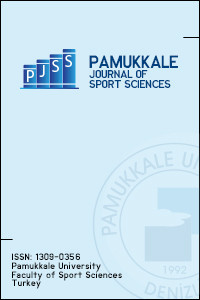EVALUATION OF GENDER KNOWLEDGE, BEHAVIORS AND ATTITUDES OF PHYSICAL TRAINING AND SPORTS STUDENTS
EVALUATION OF GENDER KNOWLEDGE, BEHAVIORS AND ATTITUDES OF PHYSICAL TRAINING AND SPORTS STUDENTS
Human sexuality is a highly complicated and specific phenomenon made of different components. Human sexuality is a component of physical and mental health and affects our thinking, behavior, interactions and our entire life. It has been observed in groups which offer training and service in Physical Training and Sports, numerous studies were made on physical, psychological and social aspects of individuals yet a very limited number of studies were made on assessment of sexual knowledge, attitudes and behaviors. In this descriptive study realized to evaluate sexual knowledge, behaviors and attitudes of students at the school of physical training and sports, data was collected by the student information form and the Sexual Attitudes Questionnaire (SAQ) and evaluated using percentage distribution, correlation and t test in SPSS 16.0 software. A large part of the student group which was mainly made of male students (75%) and those who have lived for a longer period of time at central areas in their life (73%), pointed at unofficial channels such as friends (62%) and the internet (46%) as their source of information on sexuality. The most widely known sexually transmitted disease (STD) is AIDS (72%). Other STDs have a very low level of acquaintance. While female students exhibited a more conservative attitude compared to males in all areas of SAS, they exhibited a similar attitude to male students in the subscale of attitude towards their own sexuality. The study determined that students needed accountable information sources on sexuality and their level of sexual attitude could be considered conservative.
___
- Bingöl, B., Bingöl, Ş., Gündoğdu, C. (2012). Determine the anxiety level of national team taekwondo athletes before matches who studied at universities. Selçuk University Journal Of Physical Education And Sport Science, 14(1), 121-125.
- Bulgu, N. (2012). Masculine meanings of violence in soccer. Hacettepe J. of Sport Sciences, 23(4), 207-219.
- Büyükkayacı Duman, N., Yilmazel, G., Topuz, Ş., Başci, A., Yüksel Koçak, D., Büyükgönenç, L. (2015). Üniversiteli Gençlerin Üreme Sağlığı ve Cinsel Sağlığa İlişkin Bilgi, Tutum ve Davranışları. Yıldırım Beyazıt Üniversitesi Hemşirelik E-dergisi, 3(1).
- CEDAT. (2007). Cinsel Yaşam ve Sorunları. from http://www.cetad.org.tr/books.aspx?list=5, (Date accessed: 02.05.2016)
- Duyan, V., Duyan, G. (2005). Turkish social work students’ attitudes toward sexuality. Sex Roles, 52(697-703).
- Demir, T. Ş. (2014). Knowledge of students of selçuk university about sexually transmitted infections. Düzce Üniversitesi Sağlık Bilimleri Enstitüsü Dergisi, 4 (3), 19-24.
- Özşaker, A.C., Yıldız L. (2014). Relationship between epistemological beliefs and self-esteem of physical education teacher candidates. Nigde University Journal of Physical Education And Sport Sciences, 8(1), 155-164.
- Saraç, L. (2014). An examination of the relationship among knowledge and attitudes toward homosexuals and religiosity level of physical education teacher candidates. Pamukkale Journal of Sport Sciences, 5(1), 77-91.
- Southall, R. M., Nagel, M. S., Anderson, E., Polite, F. G. and Southall, C., (2009). An investigation of male college athletes’ attitudes toward sexual-orientation. Journal of Issues in Intercollegiate Athletics, Special Issue, 62-77.
- WHO. (2015). Defining sexual health. http://www.who.int/reproductivehealth/topics/sexual_health/sh_definitions/en/ (Date accessed: 11.01.2016)
- Başlangıç: 2010
- Yayıncı: Pamukkale Üniversitesi
Sayıdaki Diğer Makaleler
Eda MUŞTU ÖZYAKAN, Leyla SARAÇ
Günay YILDIZER, Deniz ŞİMŞEK, İzzet KIRKAYA, Elvin ONARICI GÜNGÖR
EVALUATION OF GENDER KNOWLEDGE, BEHAVIORS AND ATTITUDES OF PHYSICAL TRAINING AND SPORTS STUDENTS
Nermin GÜRHAN, Azize ATLI ÖZBAŞ, Mehmet KOÇAK
Emine KUTLAY, Ercan HASLOFÇA, Tezan BİLDİK, Manuel SİLLERO QUİNTANA
Self-Objectification in the Fitness Center Environment: A Qualitative Perspective
Research of the Coordination Abilities in Rhythmic Gymnastics
